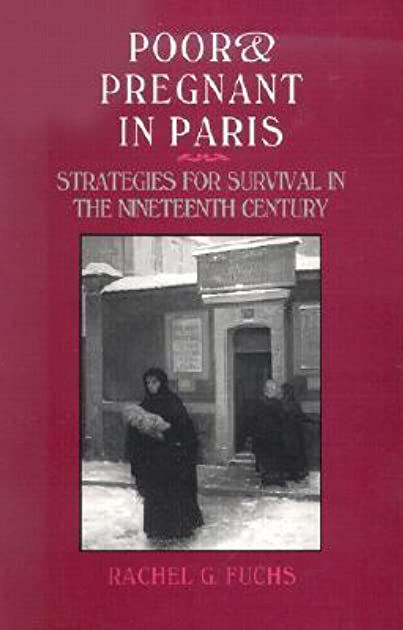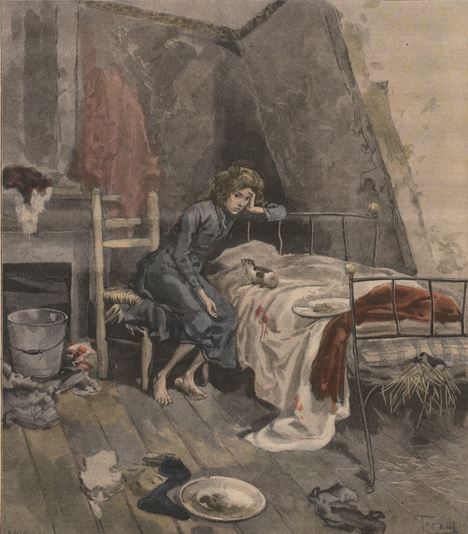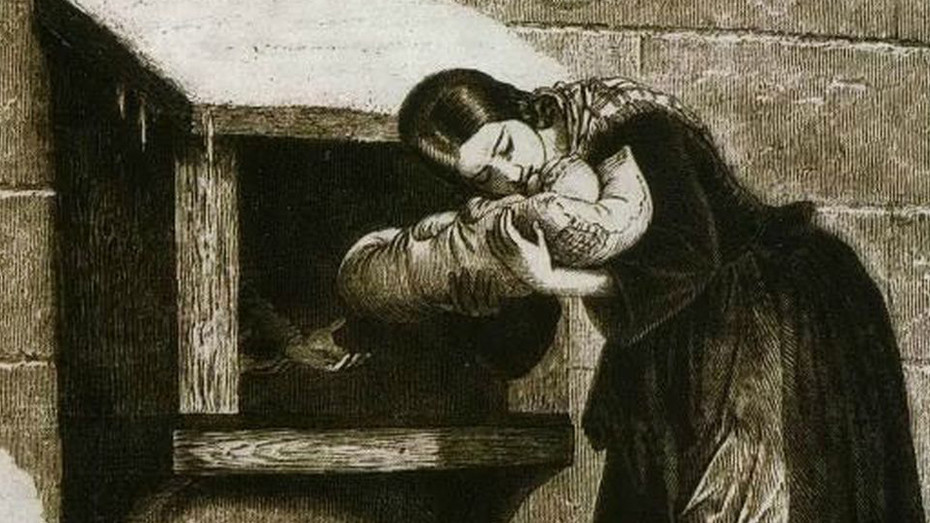Rachel G. Fuchs, Poor and Pregnant in Paris: Strategies for Survival in the Nineteenth Century, New Brunswick, Rutgers University Press, 1992, pp. 11-12.
Ernestine
Pallet's unwed mother died soon after giving birth to her in 1862 at the
public hospital , l'Hotel- Dieu.
Ernestine was released
to her aunt who soon abandoned her at the public foundling home, the
Hospice des Enfants Assistes. Foundling home authorities sent Ernestine
to a wetnurse and foster family who worked as farmers in Burgundy. When
Ernestine was twelve , her aunt reclaimed her and placed her as an
apprentice metal polisher. In 1878, at the age of sixteen, while still
living with her aunt and working as a metal polisher, Ernestine met
Eugene Legault, a twenty-two-year-old whom many accused of being lazy
and brutal. When drunk, he chased Ernestine with a knife. Ernestine
quarreled with her aunt who vehemently opposed the liaison, so she moved
into a cheap furnished room in the eleventh arrondissement in the
Belleville section of Paris. She soon became pregnant , and in November
1879, when she sought admission to nearby l'Hopital Saint-Louis, the
admissions officers brought her to a nearby public-welfare midwife where
she gave birth to a baby boy. Pallet was just seventeen at the time.
Dieu.
Ernestine was released
to her aunt who soon abandoned her at the public foundling home, the
Hospice des Enfants Assistes. Foundling home authorities sent Ernestine
to a wetnurse and foster family who worked as farmers in Burgundy. When
Ernestine was twelve , her aunt reclaimed her and placed her as an
apprentice metal polisher. In 1878, at the age of sixteen, while still
living with her aunt and working as a metal polisher, Ernestine met
Eugene Legault, a twenty-two-year-old whom many accused of being lazy
and brutal. When drunk, he chased Ernestine with a knife. Ernestine
quarreled with her aunt who vehemently opposed the liaison, so she moved
into a cheap furnished room in the eleventh arrondissement in the
Belleville section of Paris. She soon became pregnant , and in November
1879, when she sought admission to nearby l'Hopital Saint-Louis, the
admissions officers brought her to a nearby public-welfare midwife where
she gave birth to a baby boy. Pallet was just seventeen at the time.
Not wanting to abandon her baby, as
she herself had been abandoned, she breastfed her infant for two months,
then weaned him so she could go back to work. Ernestine wanted to marry,
but whenever she suggested it to Eugene, he laughed at her. He provided
no child support and also squandered all of Ernestine's earnings on
drink and gambling. On January 31, 1880, Eugene took all their money, 65
Francs, and left her and their infant son without food or resources.
Ernestine had no money and neither she nor her baby had anything to eat.
Not wanting to beg in the street , she asked a neighbor for help, but
that neighbor refused her. She dared not ask her aunt for help because
of the argument over her relationship with Eugene. His mother, with whom
he lived much of the time, had helped out with child care and food, but
had refused further help without remuneration because Ernestine and
Eugene earned good wages. She could earn 4 francs, and he earned 7
Francs, on days that they worked.
On the
second day without food, as she later testified , she had gone to the
offices of Public Assistance. She went to one office where she hoped to
abandon her baby; but officials deterred her. At another office she
sought immediate assistance, and when she finally saw an official, he
told her to return in a week because he had to conduct an investigation
to find out if it were true that she "was dying of hunger." She left in
tears, denied help from Public Assistance and without any food for her
hungry and crying baby. In desperation, overcome by madness, she
claimed, she strangled her
baby and then told everyone that she
had abandoned
him
to Enfants Assistes.
 Ernestine loved this man
who battered
her, and she became pregnant again. In
May of 1881, almost
nine months pregnant, she finally left
Eugene because of his abuse. She sought admission to la Maternite , but
was refused because she was not in labor. Not wanting to return to her
violent lover, she turned herself in to the police for the crime of
infanticide that she had committed in February 1880. The jury convicted
her of murder, but with extenuating circumstances. She had to serve five
years in prison, in part
because of testimony from public
officials that
there was no record of her asking for
assistance, and that bureaucrats at Public Assistance never tell a woman
that she has to wait eight days. Furthermore, officials averred,
Ernestine could have employed other strategies to save her son and
herself.
Ernestine loved this man
who battered
her, and she became pregnant again. In
May of 1881, almost
nine months pregnant, she finally left
Eugene because of his abuse. She sought admission to la Maternite , but
was refused because she was not in labor. Not wanting to return to her
violent lover, she turned herself in to the police for the crime of
infanticide that she had committed in February 1880. The jury convicted
her of murder, but with extenuating circumstances. She had to serve five
years in prison, in part
because of testimony from public
officials that
there was no record of her asking for
assistance, and that bureaucrats at Public Assistance never tell a woman
that she has to wait eight days. Furthermore, officials averred,
Ernestine could have employed other strategies to save her son and
herself.
The story
of Ernestine Pallet illustrates the limited choices open to a desperate
woman who was poor
and
pregnant in
Paris.
It shows the failure of neighborhood
and family networks to help her and the failure of private charity or
public assistance to come to her relief in 1880. It also highlights the
importance of public hospitals and midwives to Ernestine in 1879 and in
1881, and to her mother in 1862, while it
raises questions about how poor women
managed in France's largest city.
